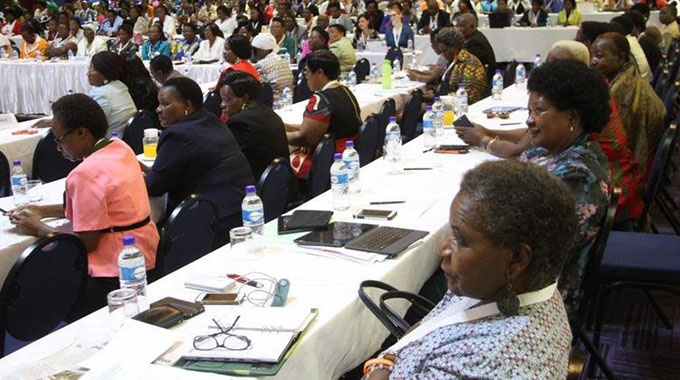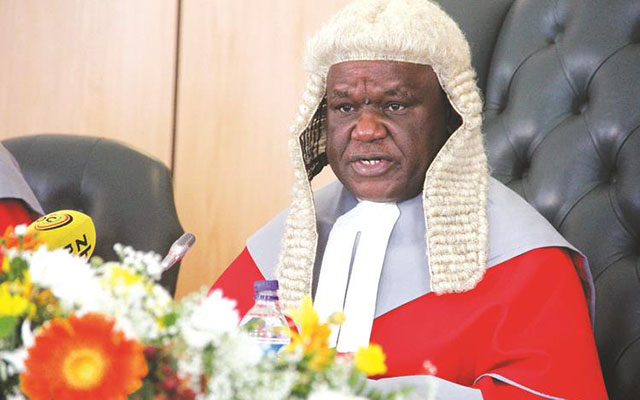Easter time and the meaning of faith

Sekai Nzenza on Wednesday
‘Thanks be to God, who delivers me through Jesus Christ our Lord!” Romans 7 verse 25.
As Easter time approaches, I become very spiritual. I feel guilty of the sins I may have committed or not committed.
I look back to the days of my youth and remember the time when I first went to Kwenda Methodist Mission Boarding School. It was in that school that I met the British missionaries, who told me that I was a sinner born in darkness.
In order to help Africans see the light of salvation, the missionaries came all the way from England to live among natives like me so that we could know about the Lord Jesus Christ.
Through Him, we would see the light of civilisation. Without Jesus, we were going to live and die in sin. Hell fire and brimstone waited for us in heaven. I was afraid. But the missionaries said Jesus Christ was nailed on the cross and died so that we could live everlasting life in heaven.
Before going to Kwenda Mission, I had been told about Jesus so many times by my parents, who were Anglicans. But their Anglicanism did not stop them from brewing beer and participating in ceremonies to honour Vadzimu, the ancestral spirits. My parents said the European missionary God was the same as Mwari, our African God. The only difference was that God had a son called Jesus, who was born by the Virgin Mary. There was God, Jesus Christ and the Holy Spirit. The three in one. Mwari vatatu mumwe.
My grandmother, Mbuya VaMandirowesa, laughed at the whole idea of a Christian God. She said it was all madness. God did not have a son. Besides, a virgin cannot have a child.
My mother said we should not pay much attention to Mbuya’s blasphemy because if we did, there would be no education for us.
For my mother, Christianity, Anglicanism and Western education came as one package. She said somewhere along the journey of life, Christianity and Anglicanism were probably going to disappear, but education would stay in our heads. Nobody was going to take education away from us. As children, we were sent to boarding school and the missionaries happily welcomed us.
My sister Charity, the one who later became a diplomat with the Ministry of Foreign Affairs, attended St Francis of Assisi near Nharira, in Chikomba West.
This was a Catholic boarding school. My brother Sidney went to Kutama Catholic Boys College in Zvimba. During school holidays, the six of us children from different mission schools ate in our mother’s hut.
We occasionally prayed before we ate. When school holidays ended, we loaded the school trunks in the scotch cart for the journey to the bus stop, nine kilometres away.
But we did not leave the village homestead without gathering together in the kitchen hut so my mother could talk to the ancestors in the form of totem recitation or prayer. There were a few seconds of silence before my mother addressed the ancestors, calling a few by their names and asking them to protect us as we made our separate journeys to boarding school.
After clapping, she ululated and told us to go and study hard because there was no future at all without education.
During our years at boarding school, my mother never visited us. She was too busy caring for my younger sisters, working in the fields, brewing beer and making clay pots to raise money for school fees. We went back home for the Easter holidays.
I recall attending a Bible study class at school a few days before Easter time.
I looked at the picture of Jesus hanging on the cross and I was consumed with guilty. Although I was saved, I still felt the burden of sin. I spoke to Miss Hutchinson, the missionary who led the weekly Bible study sessions. She said it was very common for Christians to feel guilty. Sin was heavy. Miss Hutchinson read from Romans Chapter 7, verses 14 to 25.
In that passage, the Apostle Paul agonises about sin. Writing this epistle to the Romans, Paul says he is consumed by his sinful nature.
In verses 19, Paul writes, “For I do not do the good I want to do, but the evil I do not want to do – this I keep on doing. Now if I do what I do not want to do, it is no longer I who do it, but it is sin living in me that does it.”
Paul goes on to say that he is a wretched man seeking that his body be saved and delivered from death. In verse 25, Paul celebrates the power and deliverance he got from knowing Jesus. He writes: “Thanks are to God, who delivers me through Jesus Christ our Lord!”
Miss Hutchinson’s Bible study renewed my strength to go back to the village and witness the Good News about Jesus and salvation from sin to my sisters, especially Charity, who was a lot closer to me in age than the others.
Charity said I was wasting my time telling her about sin and guilt. The priests and nuns at St Francis of Assisi had told her that if you sin and confess, you will be forgiven.
Charity would, therefore, do some terrible bullying of us and not feel bad at all. She said God forgave her each time she confessed. At night, I asked Charity and my other sister Paida if I could pray before we squeezed together on the spring mattress on a three quarter bed.
I sang “What a friend we have in Jesus”. In her deep, almost male-like voice, Charity sang along with me, while Paida hopelessly tried to sing the soprano.
After a few lines, they both forgot the words and hummed. I knew all the words by heart. I raised my voice, especially on the words that said, “Can we find a friend so faithful, Who will all our sorrows share?”
At this point Charity ordered me to shut up because this was a bedroom and not a church. Charity was fierce. I stopped singing and vowed to pray for them so that one day, they too would be saved from sin and receive salvation.
On the day Charity died, mourners asked what church she belonged to. I said Charity was not a church goer. My mother asked the Anglican Church to lead the funeral procedures.
My sister Charity has been gone now for almost seven years. I sometimes wonder if she got to heaven. If she did, was she able to meet with my father, my brother Charles, the other sisters and Mbuya VaMandirowesa who departed long before everyone else did? When my mother died a year later, was Charity there to welcome her?
Sometimes, I imagine my mother gathering her children together somewhere in heaven. She must notice that some of us are not there yet. Then they sit together with my father while Mbuya VaMandirowesa takes her snuff, laughing and mocking Jesus the way she used to do.
Maybe my departed family enjoys talking about their lives when they lived here on Earth. I know for certain that none of them was saved. And yet, I am not at all in a position to point at them as sinners because I am probably a worse sinner than they ever were.
But I do not forget them. Their blood runs in me. The mystery of life and death is beyond us to comprehend.
Only faith gives us hope. In the village, we have followed the tradition of the kurova guva ceremony so that the spirits of those who have departed maintain an ancestral presence and protect us.
These days, the people from many faiths no longer believe in the kurova guva ceremony because they say Jesus is the Truth and the Life. He said no one comes to the Father except by Him.
At Easter time, the Christian world remembers the death of Jesus and the forgiveness of sin. On Easter Sunday, we celebrate the resurrection. We are filled with hope and the idea of an everlasting life.
Down here in Chikomba East, not too far from the Hwedza Mountains where I come from, the followers of Apostle Paul Mwazha will meet at Guvambwa, near Sadza. The followers of Bishop Manhango will worship at Chiwiriri Mountain.
Across the Chinyika River, looking towards Chinyamungororo Heroes’ Acre, my nephew Bishop Peter Muroyi will gather members of his Holy Church and they will remember the death and resurrection of Jesus.
At Mhari, near Gombe Mountain, the Dutch Reformed Church has since changed name to the African Reformed Church and they will remember Jesus over there too. I shall go to Mufudzi Wakanaka Anglican Church, to honour my father because he was the first teacher and catechist, who built the school and named this church in 1948.
But I will also join other worshippers in different places, because on Good Friday, Jesus died for all of us.
We worship the same God. Mwari mumwe chete.
Dr Sekai Nzenza is a writer and cultural critic.









Comments